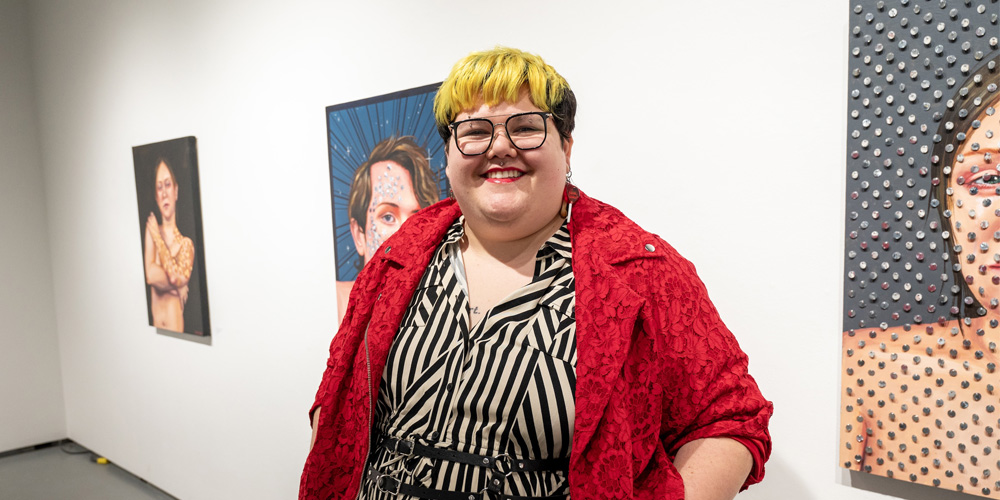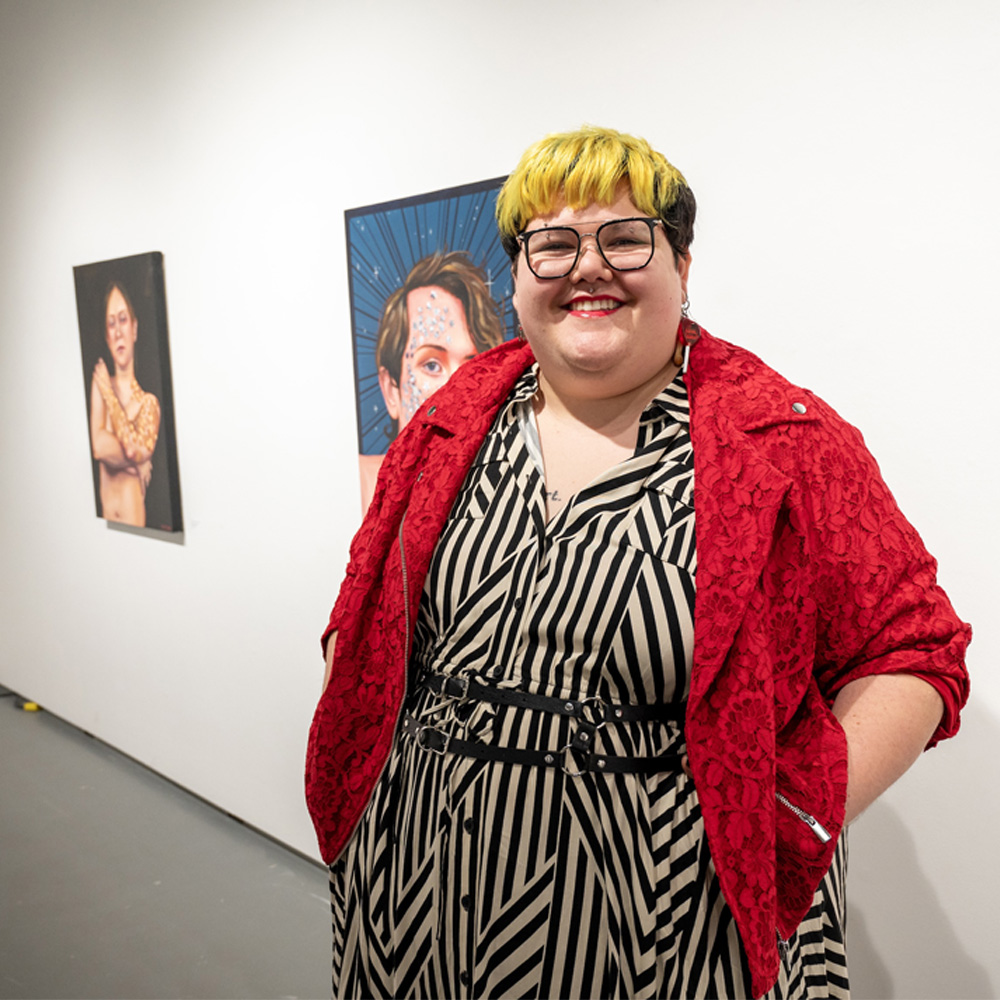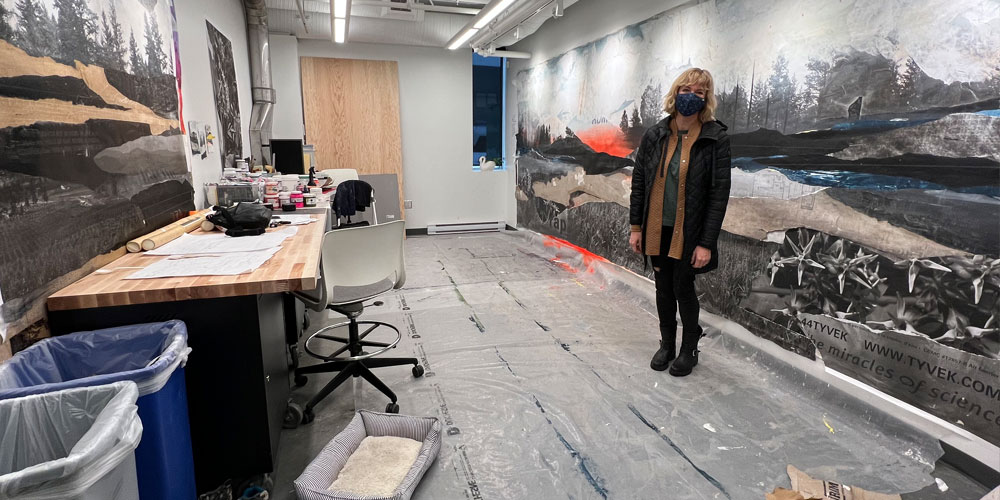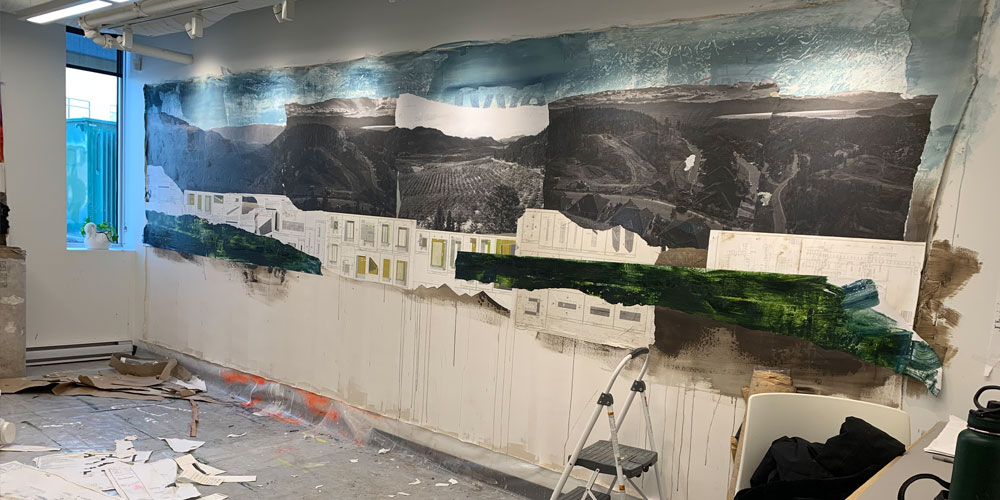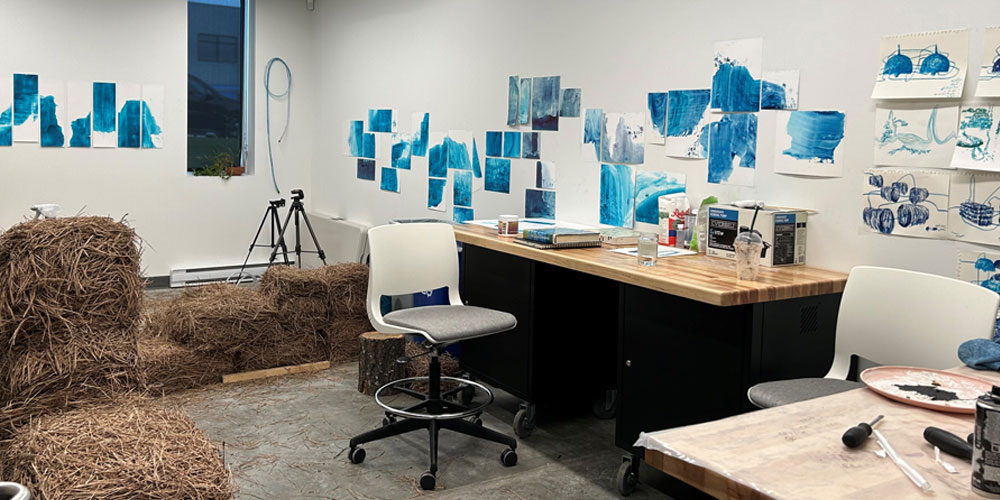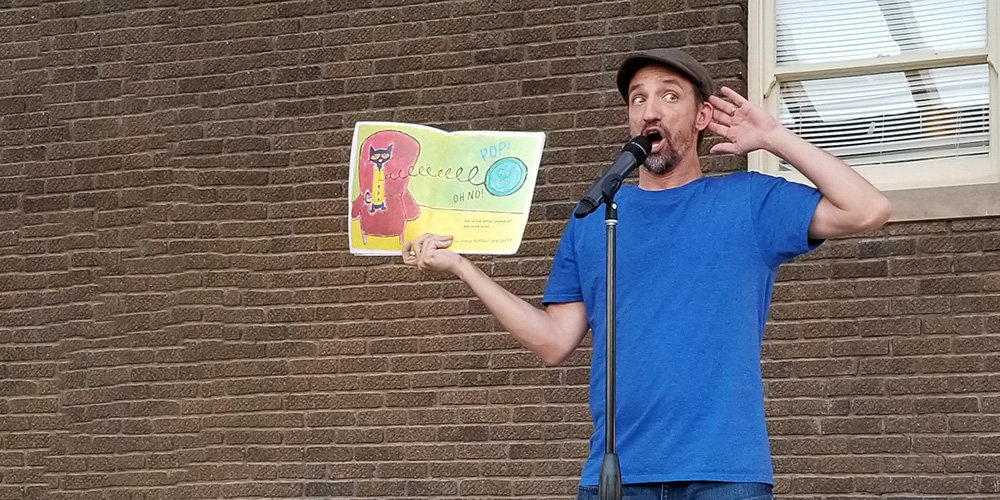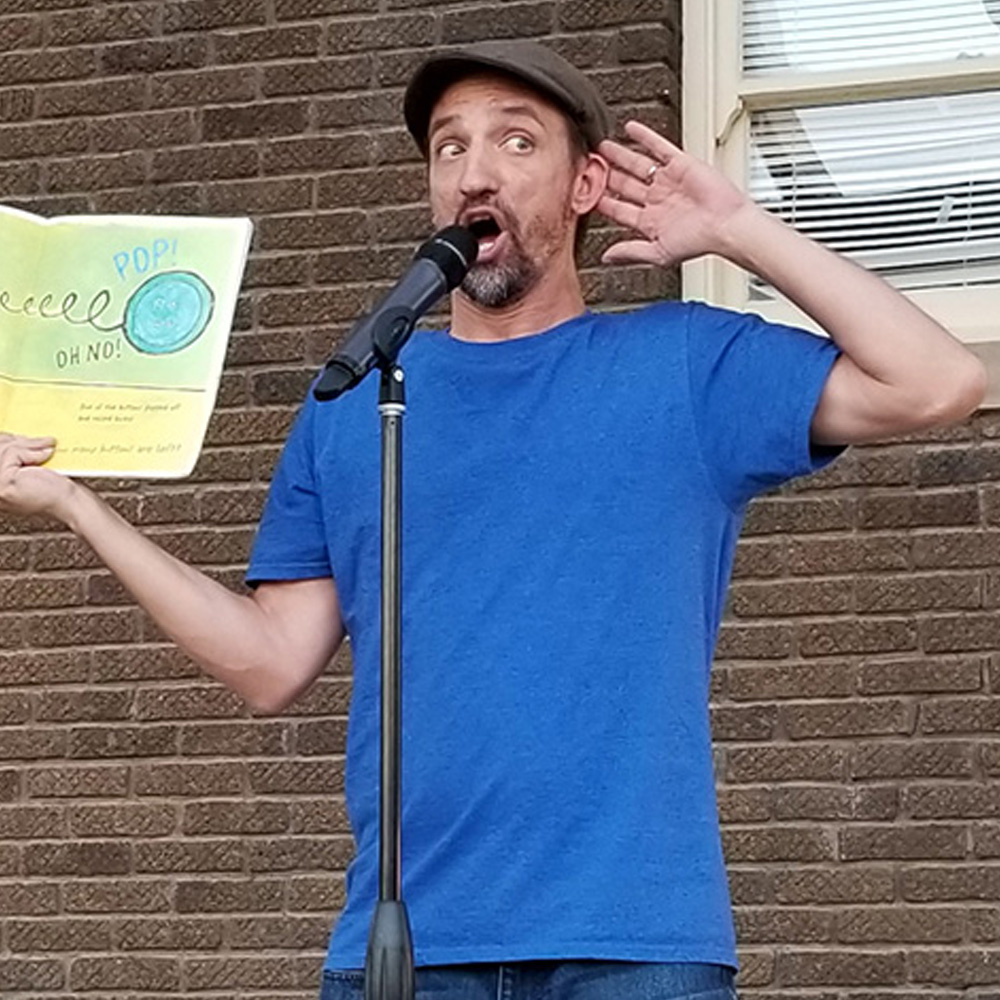Master of Fine Arts (MFA)
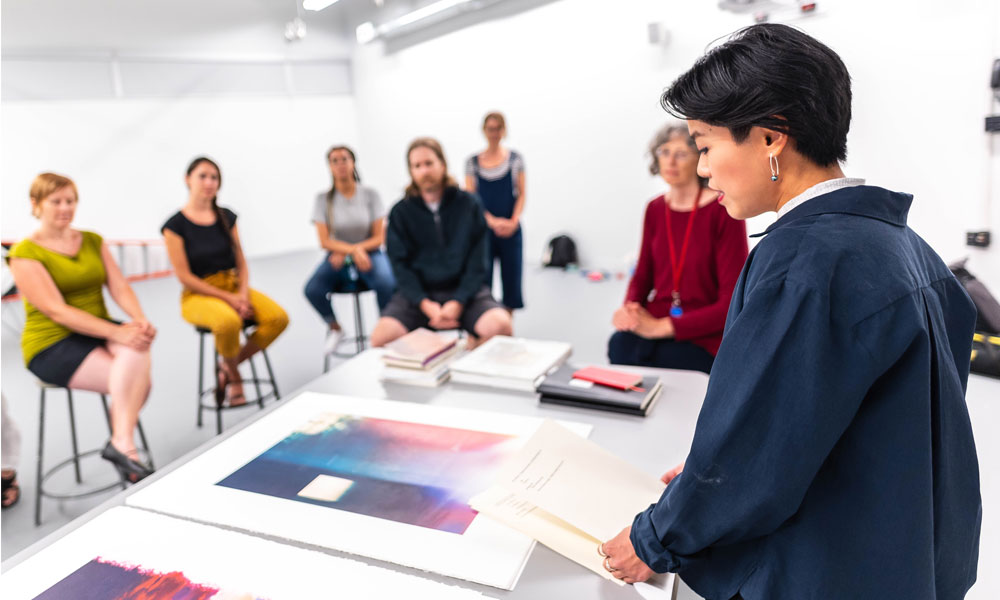
Faculty of Creative and Critical Studies
| Program | Components | Length |
|---|---|---|
| Masters of Fine Arts | Coursework, creative practice, thesis | 18 to 24 months |
Why study Master of Fine Arts at UBC Okanagan?
Our Master of Fine Arts (MFA) program provides students with opportunities to develop sophisticated production skills within a variety of media. Students are encouraged to engage in and investigate creative practice-based research that combines an interdisciplinary approach bridging academic research and fine-arts disciplines, and explore non-traditional community or collaborative creative practices.
There are three areas of specialization to choose from, Visual Arts, Creative Writing, or Interdisciplinary Studies, which share a colloquium course that helps to develop bonds between differing areas while promoting innovative and interdisciplinary artistic opportunities. All three areas share an MFA Colloquium course that helps to develop bonds between differing areas while promoting innovative and interdisciplinary artistic opportunities.
The specialization in Visual Arts requires an exhibition of a body of work completed during residency in the program, a written thesis, and an oral defence of both the exhibition and written thesis. Students are required to exhibit their thesis work as part of a cohort ‘MFA Thesis Exhibition’ scheduled sometime during May-July in the second year. Exact dates and exhibition venue to be determined on a yearly basis.
Students specializing in Visual Arts must complete the following 30 credits:
- CCS 506 (3) M.F.A. Graduate Colloquium I;
- VISA 582 (3) Graduate Studio in Visual Arts I;
- VISA 583 (3) Graduate Studio in Visual Arts II;
- one additional 3-credit course; and
- CCS 599 (15) Masters Thesis
The specialization in Creative Writing requires a full-length work of publishable quality (book-length poetry, fiction, or non-fiction manuscript, full-length stage play, libretto or screenplay) with a 2,500 to 5,000 word introductory support paper, and an oral defense.
Students specializing in Creative Writing must complete the following 30 credits:
- CCS 506 (3) M.F.A. Graduate Colloquium I;
- 6 credits of CRWR 581 Graduate Workshop in Creative Writing- Lyric (taken twice for a total of 6 credits); OR
- 6 credits of CRWR 582 Graduate Workshop in Creative Writing-Narrative (taken twice for a total of 6 credits);
- one additional 3-credit course; and
- CCS 599 (15) Masters Thesis
of a body of work and a written research paper in a secondary area of study (or occasionally a creative work in a different field from the primary area)—generally a substantial, scholarly work between 3500-5000 words in length in the student’s secondary, complimentary discipline. The written research paper and the creative and/or curatorial body of work should have substantial linkages in theoretical or topical context. An oral defense of both the artistic and/or curatorial body of work and the written support paper is required.
Alternate thesis structure and content, such as the completion of two creative works, may be considered if planned ahead, especially in cases where a student’s work is interdisciplinary in nature.
Thesis descriptions of the primary creative disciplines for students in the specialization of Interdisciplinary Studies:
- Primary Discipline in Creative Writing
Requires a full-length work of publishable quality (book-length poetry, fiction or non-fiction manuscript, full-length stage play, or screenplay). - Primary Discipline in Visual Arts
Requires an exhibition of a body of work completed during residency in the program. The work presented must be documented. - Primary Discipline in Performance
Requires a publicized event equivalent in scope and profile to a full-length evening performance, with documentation of the creation and development of the work. The performance must be shown in public a minimum of three times over a period of two weeks. - Primary Discipline in Curation
Requires a curated show demonstrating the student’s abilities to plan, research, develop, administer, implement and document a professional curatorial project.
Students specializing in Interdisciplinary Studies must complete the following 30 credits:
- CCS 506 (3) M.F.A. Graduate Colloquium I;
- 6 credits of creative practice or curation courses in the student’s primary discipline. This might include CRWR 581, CRWR 582; VISA 582, VISA 583; CCS 510, CCS 511, CCS 512; or graduate THTR classes.
- one additional 3-credit course in a field relevant to the secondary complimentary discipline (which may be a creative discipline or a discipline from an academic area other than Creative Writing, Visual Arts, or Theatre); and
- CCS 599 (15) Masters Thesis
All MFA students are required to complete 30 credits as follows: 3 credits of methodology (CCS 506 MFA Graduate Colloquium I); 12 credits of additional coursework, 6 of which must be in the student’s area of creative practice specialization; and the MFA Thesis (15 credits) which requires students to produce a significant body of original artistic work. Graduate level classes may be taught alongside undergraduate VISA or CRWR courses.
Research and Supervisors
Research Areas
Graduate students can pursue these and other faculty research and teaching interests:
|
|
Supervisors
The success of UBC Okanagan’s MFA program depends on exceptional students.
Applicants should indicate their preference for a supervisor in the statement of intent or in the application. Supervisors will be assigned once applicants are admitted. We look forward to hearing about your research interests and career goals.
Research interests: Creative writing, fiction, creative nonfiction, literary journalism, dramatic writing.
Research interests: visual art, printmaking, drawing, contemporary printmaking theory and practice, popular culture, interactive installation, innovation sustainability and safe practices in printmaking, curatorial practices.
Research interests: visual art, new media, video, drawing 2D; media for social change; climate change; interactive art; experience design.
Research interests: visual art, sculpture, installation.
Research interests: performance, interdisciplinary performance; applied theatre; interventionist performance; eco art; experimental & Documentary
Digital Media.
Research interests: performance studies, cultural anthropology, experimental ethnography, Indigenous epistemologies and methodologies, ritual performance, embodied research, physically-based performance training, body-voice integration, traditional singing, world performance traditions, experimental and intercultural theatre, devising.
Research interests: creative writing, poetry, short story, non-fiction, writing and community learning.
Research interests: visual art, sculpture, installation, environment and architecture; immersive installations; fiction, narrative and sound.
Research interests: Contemporary Painting, Drawing and Printmaking practices; Environmental Sciences; Landscape pictorial conventions and issues bordering Relational Abstraction and Representation; Collaboration and interdisciplinary research methods; Religion; Chaos theory and anti-aesthetic theory.
Research interests: New media art, virtual reality, physical computing, critical design, geo location, visual art, interactive art.
Research interests: creative writing, concrete poetry, experimental film, Canadian literature, fiction and drama, poetry, screenwriting.
Research interests: Ndé consciousness of time, place, and homeland; Indigenous women’s consciousness of land-based relations in Kónitsąąíí gokíyaa (Lipan Apache country); Indigenous consciousness along the Río Grande River; Indigenous Peoples & Human Rights; Borders; Militarization; Memory; Indigenous decolonial concepts; Self-Determination; Transitional Justice; the Poetics of Indigenous Movements.
Research interests: visual art, digital media; interactive sound art; technology-based art; creative coding.
Research interests: Innovating Artistic and Socially Motivated Design through Creative Media by means of Gamification in Digital Heritage Preservation, Museums Archives and Digital Conservation; Employing Creative Media for the Socially Disadvantaged by means of Adopting Extended Realities and Intelligence Technologies for well- being.
Facilities and Labs
The MFA program includes state-of-the-art production with 21st-century digital, printmaking, sculpture and photography studio facilities. While in residence, each student has a studio space to work in an artistic environment to explore, share and develop their own artistic community in relationship to a dynamic cohort of fellow MFA students. MFA studios, are housed in the UBC Innovation Precinct 1. The space includes studio space, communal desk space, conference rooms, lounge, kitchenette and showers. Each MFA VISA and IS student shares a 25m square space with another student, MFA CRWR students have shared desk space in a communal area. View the studios, workshops and gallery space on campus in the Creative and Critical Studies building.
Students and Alumni
Meet our students
Connect with your peers
FCCS students are significant contributors of artistic and cultural events on campus and off in Kelowna, the Okanagan Valley and beyond. MFA students have participated in many exhibitions, readings and performances on and off campus. View fine arts student work on our art blog.
View our list of MFA students and alumni profiles for you to discover more about them and their research.
Theses and Dissertations
Find all UBC Okanagan student publications on the University’s digital repository for research and teaching materials.
EXPLORE STUDENT PUBLICATIONS
Careers and Outcomes
Graduates of our MFA program have had successes in publications, exhibitions and other career opportunities including teaching and maintaining an art and studio practice.
Tuition and Funding
Tuition
For official tuition and fee information, see the academic calendar’s page on standard masters degrees.
Funding opportunities
The Faculty of Creative and Critical Studies is committed to financially supporting our graduate students to the best of our ability and providing a variety of funding options. Currently, the Faculty can provide up to two years of support for Masters students through a combination of Teaching Assistantships (TAs), Research Assistantships (RAs) and Okanagan Graduate Research Scholarship (OGRS) funding. The specific source of the funding for an individual student will depend on a number of factors and may include a mixture of TA, RA and OGRS support.
Teaching Assistantships
Providing financial support, TAs may lead seminars, help teach undergraduate courses or assist in teaching evaluations and marking. See positions currently available.
The Department of Creative Studies delivers a Non-credit credential, the Creative Practice Teaching Assistant Specialization. This training program focusses on skills for effective teaching methods in creative practices disciplines.
Research Assistantships
RAs are employment opportunities for qualified students offered by faculty members with research grants and contracts. As a paid research assistant, graduate students assist their supervisor or other researchers in conducting high-level research, which often contributes to the student’s thesis or dissertation. RAs are not guaranteed because they follow the financial cycles of the supervisor’s external grants and contracts.
FCCS Awards
All applicants are considered for admission awards of up to $5,000. Additionally, Indigenous applicants may be eligible for UBC Indigenous Awards.
UBC Awards
The College of Graduate Studies administers merit-based graduate awards at the Okanagan campus. The College manages a number of award competitions each year and administers payment of all internal awards and selected external awards.
External Awards
- Students are also expected to apply for funding through the Social Sciences and Humanities Council of Canada (SSHRC, available for domestics students only).
- Graduate scholarships and awards may also be available from foundations, private companies or foreign governments (check with your country’s education authority).
Global and Close-Knit
At UBC Okanagan, you gain all the benefits of attending a globally ranked, top 3% university while studying in a close-knit learning community.
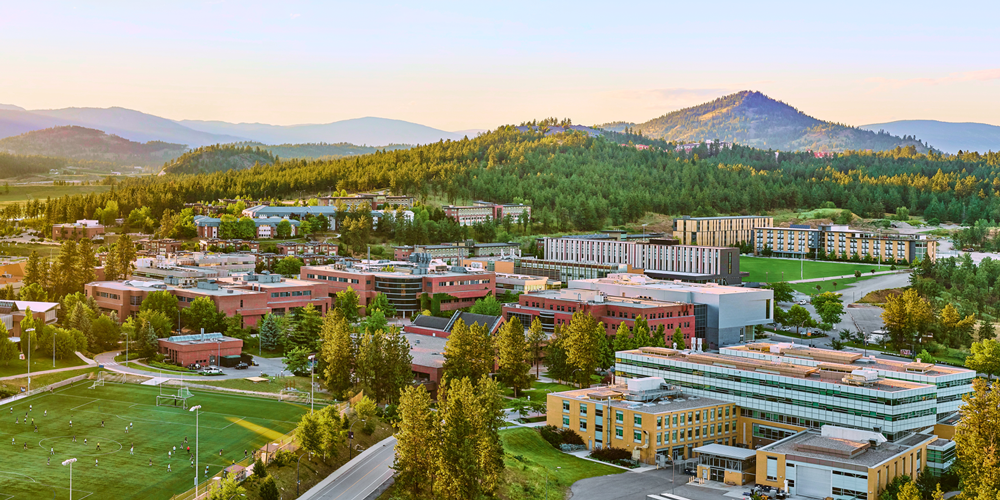
Discover the Okanagan
A diverse natural region with sandy beaches, beautiful lakes, vineyards, orchards and snow-capped mountains, the Okanagan is an inspirational landscape perfect for those seeking leisure or outdoor adventure.
UBC's Okanagan campus borders the dynamic city of Kelowna, a hub of economic development with a population of more than 150,000 people— the fourth fastest-growing population in Canada.
